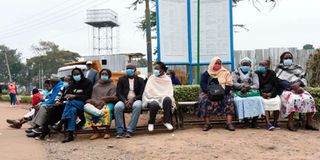Second Covid-19 dose uptake rocked by shortages, apathy

Kenyans waiting to receive a second dose of the Covid-19 vaccine at Mbagathi Hospital in Nairobi on June 17, 2021. Thousands of Kenyans who got their first dose of AstraZeneca vaccine are yet to receive the second one.
Vaccine shortages, apathy, poor communication and hitches in the Health ministry alert system have rocked the uptake of the second dose of the Covid-19 jab.
Thousands of Kenyans who got their first dose of AstraZeneca vaccine are yet to receive the second one after major centres ran out of the vaccine last month. This has resulted in the country missing its June vaccination target.
According to latest data from the ministry, uptake of the second dose stands at 50.5 per cent, with the majority being men at 55 per cent.
Of the 1,028,121 people who received the first dose, only 518,971 had received their second jab by yesterday, missing its own target of fully inoculating at least 1.25 million people by the end of June.
So far, 98,901 health workers, 160,418 persons aged 58 years and above, 71,746 teachers, and 40,970 security officers have received the second dose. Another 146,936 people who do not fall in the priority groups have also received the second dose.
Appointments cancelled
Major vaccination centres, including Kenyatta National Hospital, Mathare Hospital, Coast General Hospital and Vihiga General Hospital have experienced shortages of the second dose. The facilities cancelled some appointments as they waited for fresh supplies, which were delivered early this month.
This came as the Chanjo alert system, run by the Health ministry, was hit by hitches that saw some recipients of the first dose sent to health facilities different from their first dose centres.
The majority of the people around Nairobi were asked to visit Mbagathi Hospital where the vaccine was unavailable at the time, dashing their hopes. Some seem to have given up altogether.
“I will only take the second dose if it is brought close to my work place in the city centre. I wasted my entire day on the queue,” a security guard who missed the second jab at Mbagathi told the Nation.
He said he was not aware the vaccine was now available at KNH and other vaccination centres, pointing to poor communication by the Health ministry.
Afraid
In interviews, some Kenyans said they were afraid of the second jab due to the side effects they suffered after the first dose.
“I had to stay in bed for three days after receiving the first dose, which is why I decided not to get the second dose,” said Ann Njambi.
Others who did not wish to go on record said they felt they were sufficiently protected by the first dose. But the Health ministry and experts say it is dangerous to take a single dose of a two-dose-regimen vaccine.
According to Dr Willis Akhwale, the head of the national Covid-19 vaccine deployment, a single shot triggers a weaker immune response and may leave recipients more susceptible to dangerous variants.
Delta variant
Kenya is currently battling the Delta variant of the virus, with counties in the western part of the country put under strict control protocols.
Dr Akhwale noted that while a single dose provides partial protection, it is not clear how long it will last.
“That is why we gave priority to those who received the first dose. We wanted to ensure they get full protection, which can only happen if they get fully vaccinated,” he said.
The slow uptake of the second dose is derailing Kenya’s quest to attain herd immunity, but the health official remains upbeat that the situation will improve soon.
“We have made good progress considering a month ago we did not have vaccines. By next week, we will have at least 70 per cent of those who received the first dose get the second dose,” he said.
But the country missed its target of fulling inoculating at least 1.25 million people in the first phase by the end of last month.
The second phase of the vaccinations will involve 9.7 million people, comprising all those above 50 years old and those above 18 years old with underlying medical conditions, running between July this year and June next year.
The third phase, to unfold concurrently with the second, will be aimed at 4.9 million people, including those living in congested areas and seen as particularly vulnerable.






